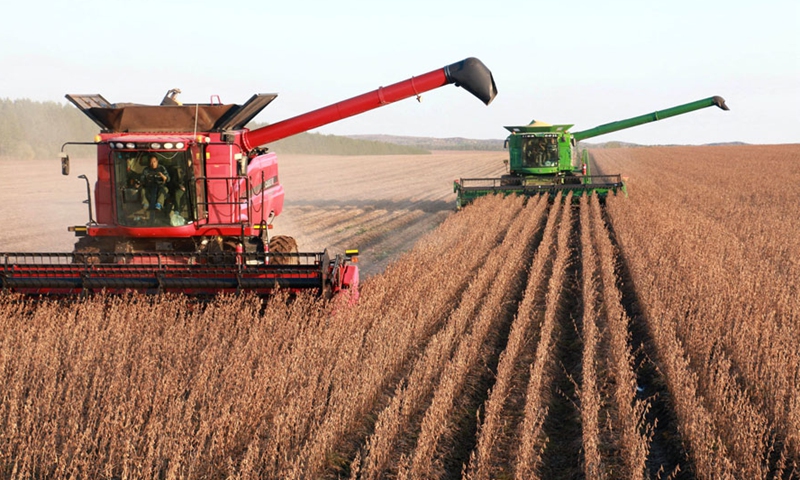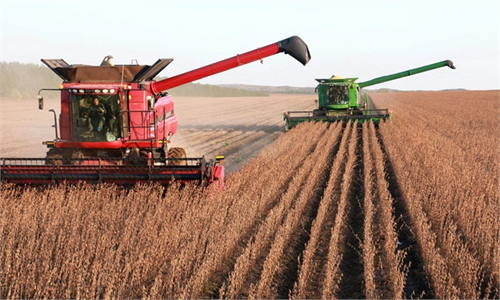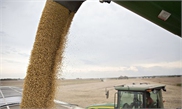
Soybeans are harvested in Heilongjiang province.File photo: Xinhua
China's efforts to introduce new content in animal feed that requires fewer corn and soy beans will have no immediate impact on global grain trade, with significant changes only to take place years later, Chinese agricultural analysts said on Friday.
China's Ministry of Agriculture and Rural Affairs has launched a campaign to lower the content of corn and soy meal in animal feed this week, calling for the country's pig and chicken farmers to substitute corn and soy beans with domestically available alternatives such as unhusked rice, wheat, coarse cereals, root and tuber crops, according to domestic news portal qhrb.com.cn.
Chinese analysts and industry insiders said the move could help consume inventory of certain grains in China, reduce supply dependence on certain countries, conserve foreign exchange and help keep pork prices in check. However, they said such a move will be a slow process and the impact on the global grain market will be small.
Jiao Shanwei, editor-in-chief of cngrain.com, a website specializing in grain news, saw the move as part of a de-Americanization drive going on in China in many industries.
"Chinese people learned how to raise pigs and poultry in a modern sense largely from the Americans. So the animal feed formula is also American, but with growing experience, Chinese people could also come up with their own formula more aligned with the domestic situation," Jiao told Global Times on Friday.
"Such a formula cannot be promulgated without having to go through a trial period, as finding the suitable feed for animals are of top concern to the country's pig and chicken farmers," Jiao said, adding that recent outbreaks of African Swine Fever have decimated the country's hog herd.
As Chinese people experience improved livelihood, the demand for animal protein has soared. With China's domestic farmland preoccupied with staple food production, this translated into a soaring demand for imported corn and soy beans.
In 2020, China imported a record 100 million tons of soy beans, while global soy bean prices surged by 20-30 percent, according to Xinhua News Agency. China imported 25.89 million tons of soy beans from the US.
As a result, corn prices are at historic highs, causing an imbalance in some regions," Jiao noted. "Therefore, the government needs to think about how to keep a balance between animal feed and staple grain."
"Another benefit of the new formula with increased domestic alternatives, including tapping some of the previous year's crop stored in silos, is that it could reduce the cost of raising animals and help keep inflation under check," Jiao said.
However, Zhao Xiangyu, chairman of Heilongjiang Province-based Liangtai Agriculture Company, said China's growing animal herd cannot be supported by domestic arable land so plant protein imports will only grow.
"There might be a difference in what China will import, but China will continue to import anyway," Zhao told the Global Times on Friday. "And China's imports will still depend on existing major exporting countries' agricultural products."
Jiao agrees, saying that the changing formula of animal feed will be a gradual process and for now there are no impacts for global grain trade.



